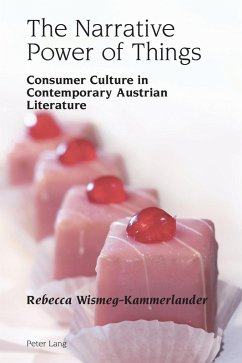In the increasingly globalised consumer culture of the twenty-first century, consumer goods have long become more than mere commodities: they are markers of identity and tools of narration. Advertising, branding and other processes of consumer culture are ubiquitous and charge objects with meaning, impacting the way we perceive them and those who wear, use, showcase or discard them. This close link between consumer culture and the narration of identities - ranging from an individual to a national level - affects the construction of «national brands», as can be seen through contemporary writing.
With a focus on post-2000 Austrian literature, this book unveils how a skilful reading of consumer objects - both branded and non-branded - can enrich literary analysis. Introducing the concept of consumer literacy and applying it to Wolf Haas' Das Wetter vor 15 Jahren, Thomas Glavinic's Die Arbeit der Nacht, Arno Geiger's Es geht uns gut and Raphaela Edelbauer's Das flüssige Land, the study showcases the narrative power of consumer goods and the impact of Austrian literature and its writers on the idyllic national brand that stands in stark contrast to a troubled past.
Hinweis: Dieser Artikel kann nur an eine deutsche Lieferadresse ausgeliefert werden.
With a focus on post-2000 Austrian literature, this book unveils how a skilful reading of consumer objects - both branded and non-branded - can enrich literary analysis. Introducing the concept of consumer literacy and applying it to Wolf Haas' Das Wetter vor 15 Jahren, Thomas Glavinic's Die Arbeit der Nacht, Arno Geiger's Es geht uns gut and Raphaela Edelbauer's Das flüssige Land, the study showcases the narrative power of consumer goods and the impact of Austrian literature and its writers on the idyllic national brand that stands in stark contrast to a troubled past.
Dieser Download kann aus rechtlichen Gründen nur mit Rechnungsadresse in A, D ausgeliefert werden.
Hinweis: Dieser Artikel kann nur an eine deutsche Lieferadresse ausgeliefert werden.


